-
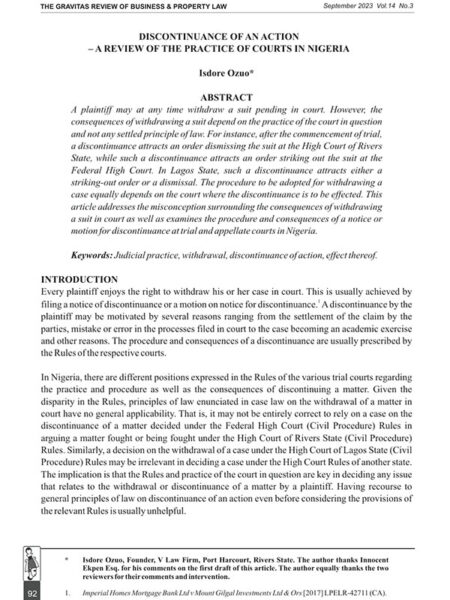
Discontinuance of an Action – A Review of the Practice of Courts in Nigeria
0₦2,500.00Isdore Ozuo, in his article, Discontinuance of an Action – A Review of the Practice of Courts in Nigeria, analyses the legal provisions on the right of a plaintiff to discontinue an action in the different strata of court. A plaintiff may at any time withdraw a suit pending in court. However, the consequences of withdrawing a suit depend on the practice of the court in question and not any settled principle of law. For instance, after the commencement of trial, a discontinuance attracts an order dismissing the suit at the High Court of Rivers State, while such a discontinuance attracts an order striking out the suit at the Federal High Court. In Lagos State, such a discontinuance attracts either a striking out order or a dismissal. The procedure to be adopted for withdrawing a case equally depends on the court where the discontinuance is to be effected. The article addresses the misconception surrounding the consequences of withdrawing a suit in court as well as examines the procedure and consequences of a notice or motion for discontinuance at trial and appellate courts in Nigeria.
-

Admissibility of Public Documents and Photocopies of Certified True Copies of Public Documents
0₦2,500.00Professor Joseph Abugu, SAN, in this article, Admissibility of Public Documents and Photocopies of Certified True Copies of Public Documents, examines two critical vexed issues on the admissibility of public documents. The first interrogates what qualifies as a public document within the provisions of the Evidence Act 2011. The second addresses the admissibility of photocopies of certified true copies of public documents. Professor Abugu posits that the essential quality of a public document must be ascertained by a conjunctive reading of sections 102 and 104 of the Evidence Act which specifies that the document must be one being kept under legal obligation by a public authority with open access by members of the public who seek to obtain a copy thereof and that routine communications of government agencies and statutory bodies do not so qualify. He also finds that the current exposition of the law on the admissibility of photocopies of certified true copies of public companies is as articulated in the 1969 decision of the Supreme court in Minister of Lands v. Azikiwe (SC) as applied in Ogboru v. Uduaghan (CA) and affirmed by the Supreme Court in Emeka v. Chuba-Ikpeazu & Ors. and in Oboh & Anr v. FNL Ltd.
-
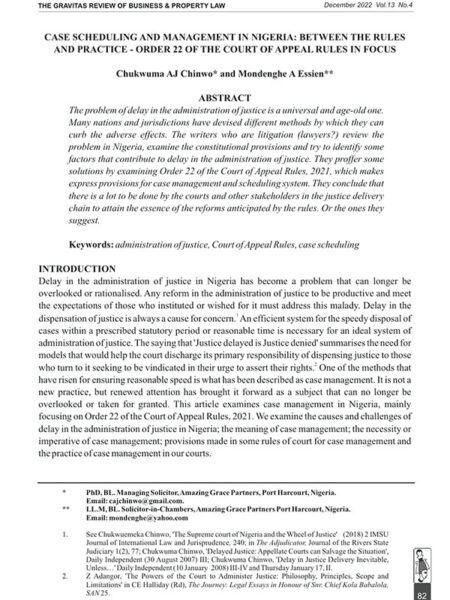
Case Scheduling and Management in Nigeria: Between the Rules and Practice – Order 22 of the Court of Appeal Rules in Focus
0₦2,500.00Dr Chukwuma Chinwo and Mondenghe Essien of the Amazing Grace Partners, Port Harcourt, Nigeria, in their article, Case Scheduling and Management in Nigeria: Between the Rules and Practice – Order 22 of the Court of Appeal Rules In Focus, note that the problem of delay in the administration of justice is a universal and age-old one. Many nations and jurisdictions have devised different methods by which they can curb the adverse effects. Chinwo and Essien review the problem in Nigeria, examine the constitutional provisions and identify some factors contributing to delay in the administration of justice. They proffer some solutions by examining Order 22 of the Court of Appeal Rules, 2021, which makes express provisions for case management and scheduling. They conclude that there is a lot to be done by the courts and other stakeholders in the justice delivery chain to attain the essence of the reforms anticipated by the rules.
-
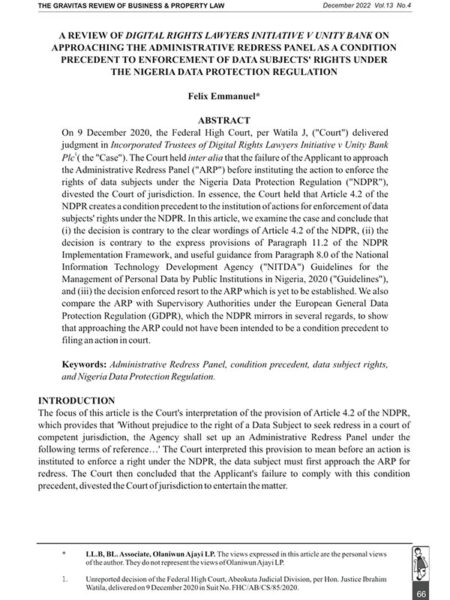
A Review of Digital Rights Lawyers Initiative V Unity Bank on Approaching the Administrative Redress Panel as a Condition Precedent to an Action Under the Nigeria Data Protection Regulation
0₦2,500.00Felix Emmanuel, Associate at Olaniwun Ajayi LP, in his article, A Review of Digital Rights Lawyers Initiative V Unity Bank on Approaching the Administrative Redress Panel as a Condition Precedent to an Action Under the Nigeria Data Protection Regulation, critically examines the decision of the Federal High Court in Incorporated Trustees of Digital Rights Lawyers Initiative v Unity Bank Plc (the “Case”) where the Court held that the failure of the Applicant to approach the Administrative Redress Panel before instituting the action to enforce the rights of data subjects under the Nigeria Data Protection Regulation (“NDPR”), divested the Court of jurisdiction. The Court held that Article 4.2 of the NDPR creates a condition precedent to the institution of actions to enforce data subjects’ rights under the NDPR. Emmanuel masterfully examines all aspects of the Case against the backdrop of relevant laws and regulations.
-
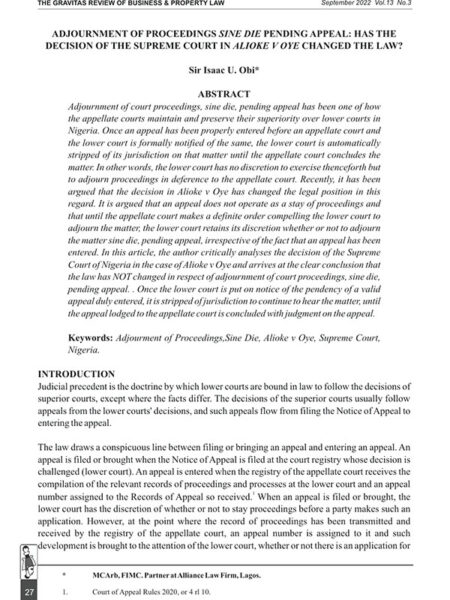
Adjournment of Proceedings Sine Die Pending Appeal: Has the Decision of the Supreme Court in Alioke V Oye Changed the Law?
0₦2,500.00Sir Isaac Obi, Partner at Alliance Law Firm, in his article, Adjournment of Proceedings Sine Die Pending Appeal: Has the Decision of the Supreme Court in Alioke V Oye Changed the Law? explains that adjournment of court proceedings, sine die, pending appeal has been one of the ways the appellate courts maintain and preserve their superiority over lower courts in Nigeria. Once an appeal has been properly entered before an appellate court and the lower court is formally notified, it is automatically stripped of its jurisdiction on that matter until the appellate court concludes the matter. Recently, it has been argued that the decision of the Supreme Court in Alioke v Oye has changed the law. It is argued that an appeal does not operate as a stay of proceedings and that until the appellate court makes a definite order compelling the lower court to adjourn the matter, the lower court retains its discretion whether or not to adjourn the matter sine die, pending appeal, irrespective of the fact that an appeal has been entered. Sir Obi critically analyses the decision in Alioke v Oye to see whether the law has really changed.
-
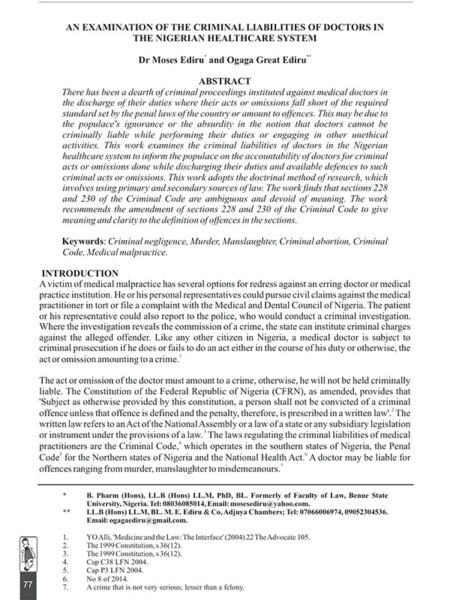
An Examination of the Criminal Liabilities of Doctors in the Nigerian Healthcare System
0₦2,500.00Dr Moses Ediru, formerly of Benue State University, and Ogaga Ediru in their article, An Examination of the Criminal Liabilities of Doctors in the Nigerian Healthcare System, comprehensively examine the criminal liabilities of doctors and how doctors could be made accountable for criminal acts or omissions done while discharging their duties. The authors consider liability for criminal negligence, murder, manslaughter, illegal abortion, and offences under the National Health Act. They also consider defences that are available to a doctor.
-
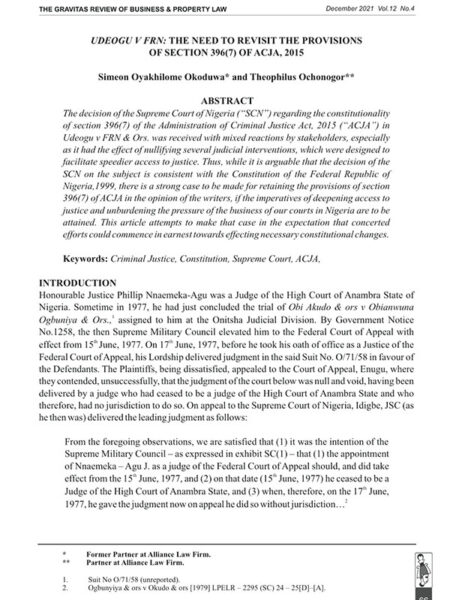
Udeogu v FRN: The Need to Revisit the Provisions of Section 396(7) of ACJA 2015
0₦2,500.00Simeon Okoduwa and Theophilus Ochonogor of the Alliance Law Firm, in their article, Udeogu v FRN: The Need to Revisit the Provisions of Section 396(7) of ACJA 2015, note that the decision of the Supreme Court which declared section 396(7) of ACJA, 2015 as inconsistent with the 1999 Constitution and therefore void needs to be revisited. The Section provides that a Judge of the High Court who has been elevated to the Court of Appeal shall have dispensation to continue to sit as a High Court Judge to conclude any part-heard criminal matter pending before him at the time of his elevation. Okoduwa and Ochonogor argue that if the imperatives of deepening access to justice and unburdening the pressure of the business of courts are to be attained, the Section needs to be retained.
-
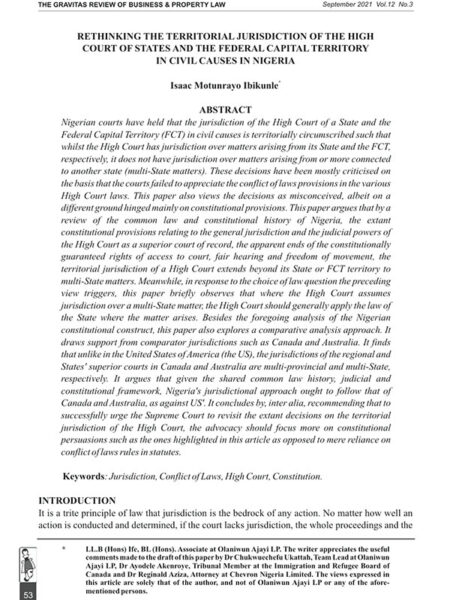
Rethinking the Territorial Jurisdiction of the High Court of States and the Federal Capital Territory in Civil Causes in Nigeria
0₦2,500.00Isaac Ibikunle, Associate at Olaniwun Ajayi LP, in his article, Rethinking the Territorial Jurisdiction of the High Court of States and the Federal Capital Territory in Civil Causes in Nigeria, notes that the extant position of Nigerian courts is that a State High Court does not have jurisdiction over matters arising from or more connected to another state (multi-State matters). He argues that this stance has been criticised because the courts failed to appreciate the conflict of laws provisions in the various High Court laws. From a review of the common law and constitutional history of Nigeria, Ibikunle opines that the territorial jurisdiction of a High Court should extend beyond its State to multi-State matters. He concludes with a recommendation that the Supreme Court should revisit the extant decisions on the territorial jurisdiction of the High Court on multi-State matters by aligning with the Canadian and Australian approaches on the issue.
-
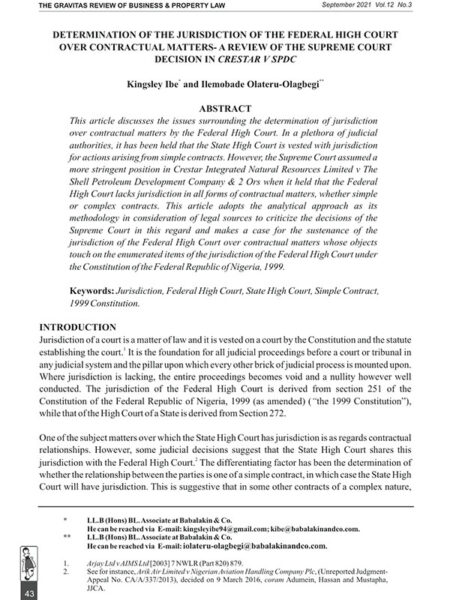
Determination of the Jurisdiction of the Federal High Court Over Contractual Matters- A Review of the Supreme Court Decision in Crestar V SPDC
0₦2,500.00Kingsley Ibe and Ilemobade Olateru-Olagbegi, both of Babalakin & Co, in their article, Determination of the Jurisdiction of the Federal High Court Over Contractual Matters- A Review of the Supreme Court Decision in Crestar V SPDC, examine the incipient confusion over the decision of the Supreme Court that a Federal High Court has no jurisdiction over contractual matters; whether the contract is simple or ‘complex’. They explore the historical jurisdiction of both States and Federal High Court on contracts, and argue that the Federal High Court should still have jurisdiction over contractual matters if the issue pertains to those items enumerated in section 251 of the 1999 Nigerian Constitution.
-
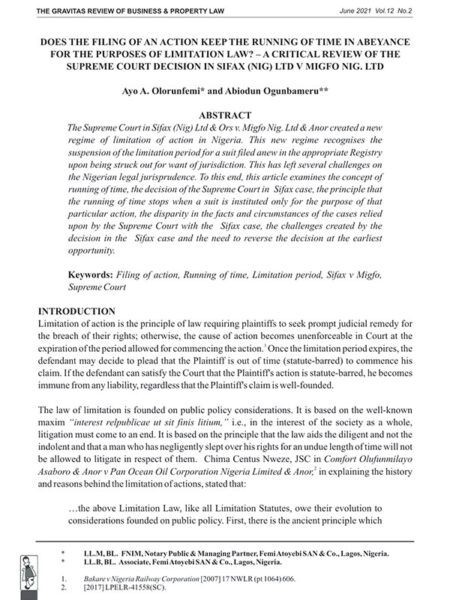
Does the Filing of an Action Keep the Running of Time in Abeyance for the Purposes of Limitation Law? – A Critical Review of the Supreme Court Decision in Sifax (Nig) Ltd v Migfo Nig. Ltd
0₦2,500.00Ayo Olorunfemi and Abiodun Ogunbameru, Managing Partner and Associate respectively at Femi Atoyebi SAN & Co in their article, Does the Filing of an Action Keep the Running of Time in Abeyance for the Purposes of Limitation Law? – A Critical Review of the Supreme Court Decision in Sifax (Nig) Ltd v Migfo Nig. Ltd, examine the new regime of limitation of action created by the Supreme Court in Sifax v Migfo and how it recognises the suspension of the limitation period for a suit filed anew in the appropriate Registry upon being struck out for want of jurisdiction. They examine the concept of the running of time, the principle that the running of time stops when a suit is instituted only for that particular action, the disparity in the facts and circumstances of the cases relied upon by the Supreme Court, and the several challenges created by the decision in the Sifax case.
-
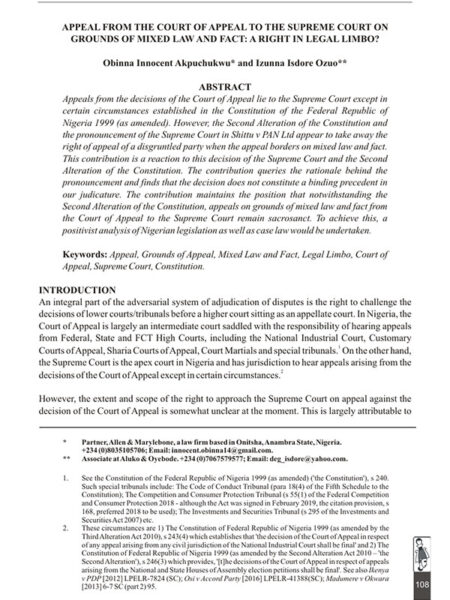
Appeal from the Court of Appeal to the Supreme Court on Grounds of Mixed Law and Fact: A Right in Legal Limbo?
0₦2,500.00Obinna Akpuchukwu, Partner Allen & Marylebone and Izunna Ozuo, Associate at Aluko & Oyebode in their article, Appeal from the Court of Appeal to the Supreme Court on Grounds of Mixed Law and Fact: A Right in Legal Limbo? note that Appeals from the decisions of the Court of Appeal lie to the Supreme Court except in certain circumstances established in the Constitution. However, a pronouncement of His Lordship Bode Rhodes-Vivour, JSC in Shittu v PAN Ltd and the Second Alteration of the Constitution appear to take away the right of appeal of an aggrieved party when the appeal borders on mixed law and fact. Obinna and Izunna query the rationale behind the pronouncement and argue that the decision does not constitute a binding precedent in Nigerian judicature. They opine that notwithstanding the Second Alteration of the Constitution, appeals on grounds of mixed law and fact from the Court of Appeal to the Supreme Court remain sacrosanct.
-
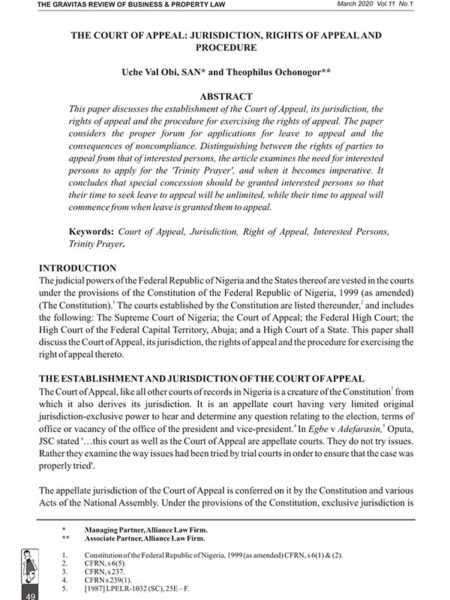
The Court of Appeal: Jurisdiction, Rights of Appeal and Procedure
0₦2,500.00Uche Val Obi, SAN and Theophilus Ochonogor of the Alliance Law Firm in their article, The Court of Appeal: Jurisdiction, Rights of Appeal and Procedure, examine the jurisdiction, rights of appeal and procedure of the Court of Appeal. They consider intriguing issues including appeals by interested persons, whether there is a time limit within which an applicant may seek leave to appeal as an interested party, whether an interested party is exempted from seeking the ‘trinity prayers’ and whether an applicant seeking to appeal as an interested party is to approach the trial high court or the Court of Appeal in the first instance.
The Gravitas Review of Business & Property Law



